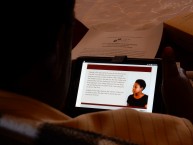
In Zimbabwe, health care workers often need to build confidence and skills in caring for HIV-positive infants and children. The International Training and Education Center for Health (I-TECH) has employed an innovative approach to support these front-line staff – a case-based, self-study PMTCT Client Retention training.
During the introductory session, participants are oriented to the course, given self-study tips, loaned tablets and instructed on their use, and given a pre-course assessment. Participants also attend a half-day classroom session at the beginning and end of the five-week course.
A WhatsApp discussion group is also set up to send messages of motivation and reminders and for participants to share issues during the course. WhatsApp is widely used in Zimbabwe as an inexpensive mobile phone platform to message individuals and groups.
WhatsApp for collaborative problem solving
Elizabeth is a primary care nurse who was among a cohort of 30 participants in one of these trainings, conducted in Mashonaland Central Province. About one week into the course, Elizabeth faced a situation at work where she was confused about how to apply national guidelines to one of her pediatric patient cases. Elizabeth chose to bring the issue to her training cohort. Below is a sample of the discussion that ensued among several members of the group, showing that a number of the cohort were similarly perplexed:
Elizabeth: A woman came to our clinic. She was ill. She wanted to get tested because she was ill for a long time on and off. The woman tested positive. Because she is breastfeeding an 11-month-old baby l commenced her on Option B+. l tested the baby with antibody RDT [rapid diagnostic test] and tested negative. l commenced the baby on cotrimoxazole prophylaxis. The question is: Was it necessary for the baby to be given NVP [nevirapine] prophylaxis since the baby tested negative and is now 11 months OR should l give the baby NVP prophylaxis for 6wks from now????
Elizabeth received a range of responses from her cohort:
- NVP is only given from birth up to six weeks. Commence mother on Option B+, baby on cotr prophylaxis collect confirmatory DBS [dried blood spots] for the child.
- I agree with ~nr
- Cotr prophylaxis and confirmatory DBS only for the baby. Thanks guys.
- Baby should still get NVP for six wks since still breastfeeding — meaning baby is still exposed.
- As per NVP shld be given — the first dose at birth, the second dose 48hrs after first dose, then third dose 96hrs after second dose. Prophylaxis shld be given as soon after delivery as possible. When prophylaxis is delayed the less likely that the infection will be prevented.
- By age of 14 days, infection already would be established in most infants. So l think it’s not necessary to give NVP as prophylaxis.
One member of the cohort was a district nursing officer (DNO). He shared that he had deliberately delayed responding until others had weighed in. He not only gave advice but also encouraged the group to refresh themselves on the resources available on their tablets:
Sorry for a late response. Remember key things in your scenario: mother is positive, baby is breastfeeding and is 11 months. … Infant is still at risk, therefore cotri prophy, infant feeding counselling and a continuation of routine FCH [family and child health] care will help. Then 6wks after stopping breastfeeding conduct rapid HIV test again. If negative stop cotri prophy and continue routine care. If positive CT cotri prophy, initiate ART.
He then referred Elizabeth to an algorithm in the national ART guidelines, which were included for easy reference in an application on the participants’ tablets.
This exchange showed the potential use of WhatsApp for support in clinical decision making, in the absence of a warmline for consultation. Upon returning to the classroom, participants engaged in discussion around the WhatsApp conversations, with particular attention paid to the case that Elizabeth had brought to the group. Other members of the cohort reported that they had watched the exchange with interest though they did not contribute.
The cohort members reported that the case was educational for them, and many of them indicated that they would like to continue their group for ongoing support.
As for Elizabeth’s young client, a rapid test was collected and returned negative. Results of the DNA test are still being awaited by the group with much interest. As one member wrote: “We cannot afford to lose that child, wherever she is. … She is still our child.”